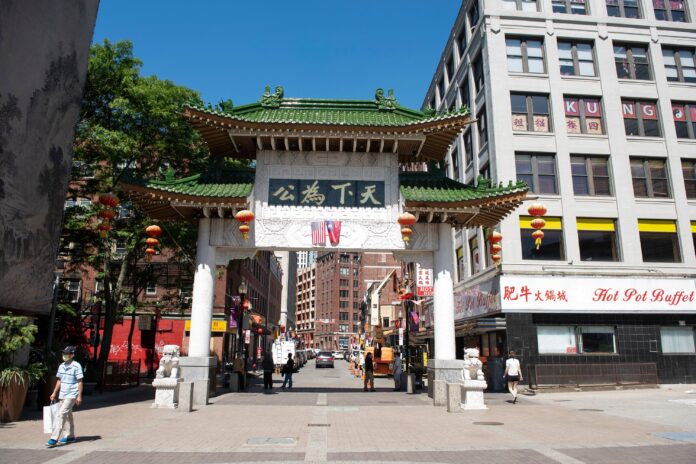Introducing First-Year Medical Students to Chinatown
Centering the experiences of Chinatown residents and organizations is also the focus of a module in a first-year medical school class called Population Health and the Profession of Medicine (PHPM).
Tang, who designed the Chinatown module, said, “We teach social determinants of health in a place-based learning modality using Chinatown. The important thing for me is for students to learn about the community where they are going to be for the next four years.”
Tang draws on ADAPT partnerships and research throughout the module, which begins with a panel of speakers including Suzanne Lee, the board chair at the Chinatown Community Land Trust, a retired principal of Josiah Quincy Elementary School, and a Chinatown resident. “The first thing I encourage students to look at is to understand the history and understand what the community is struggling with currently and what role Tufts plays,” Lee said. “Through these discussions, students begin to ask what they can do and what their role in this is.”
Sisters Erica Perry, D26, (left) and Alexis Perry, M27, performed songs in Chinese for residents of the Greater Boston Golden Age Center.
Photo: Courtesy of ADAPT
After a tour of Chinatown led by ACDC, Tang divides the students into 12 groups and assigns each group a different topic, such as healthcare access, youth development, and housing and gentrification. Depending on the topic, students might interview Tufts researchers or representatives from community organizations to learn more, or they might review relevant ADAPT-supported research. For example, students exploring heat stress, traffic, and air pollution dive into the details of the HEROS study.
At the end of the module, all the groups present what they’ve learned to the class.
“I really appreciated that Dr. Tang was interested in emphasizing the footprint of Tufts in Chinatown,” said Ariella Wagner, MBS23, M27. In fact, she wishes all medical schools helped students learn about and connect with local communities. That’s why she is working with Tang and Jennifer Greer-Morrissey, the civic life manager for health sciences at Jonathan M. Tisch College of Civic Life at Tufts University, to evaluate the impact of the course. “It would be really great if we could show to other schools that this is a valuable way to train cultural competency,” Wagner said.
Now in her second year of medical school, Wagner continued her involvement in the class by serving as a mentor for the first-year students who were assigned the topic of domestic violence. Wagner had previously been trained as a domestic violence counselor through a Tisch Fellowship, and she felt she could offer some insight into Asian culture, as well. “I am an Asian American and my mother is an immigrant from China,” she said, “so I use that background to help folks in class understand why domestic violence might be underreported in Asian communities because of language barriers.”
The class also had a lasting impact on Alexis Perry, M27, who was assigned the topic of health care disparities among elderly residents in Chinatown. Perry, who grew up on the South Shore, was drawn to Tufts in part because of the opportunity to work with the Chinatown community. She quickly formed a connection with the staff and residents at the Greater Boston Chinese Golden Age Center. “We saw the amazing work the center has done to offer culturally sensitive programs for their elders, helping to improve their quality of life,” she said. “One area we felt like we could contribute to was music. Music can enhance cognitive skills and motor coordination, and it’s a way of connecting with others.”
Since then, Perry and a few of her classmates have been presenting twice-monthly music programs at the center. They play instruments and sing, handing out maracas to the residents so they can play along. Perry has even learned new songs in Chinese to bring back happy memories to the residents.
“This experience showed us that we can work with community partners and advocate for our patients’ physical, psychological, and social wellbeing,” she said.
The music program Perry set in motion is run through the Community Service Learning (CSL) program, making it available to other students now and in the future. “Dr. Tang’s and Dr. Chu’s efforts have really energized more students into getting involved in the Chinatown community in an ongoing way,” said Greer-Morrissey, who oversees the CSL program.
That’s music to Chu’s ears, who thinks of ADAPT as an incubator where meaningful community partnerships and conversations lead to projects and initiatives that in turn spawn more opportunities for learning and collaboration – and ultimately, increased health, wellbeing, and visibility for Asian populations in Boston and beyond.
“ADAPT establishes the trust and foundation from which research and education initiatives can spring,” she said.

